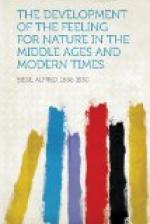Blow, blow, thou winter wind,
Thou art not so unkind
As man’s ingratitude.
Thy tooth is not so keen,
Because thou art not seen
Altho’ thy breath be rude.
Heigh-ho, sing heigh-ho unto the green
holly!
Most friendship is feigning, most loving
mere folly![4]
(As
You Like It.)
Turning again to comparisons, we find birds used abundantly:
More pity that the eagle should be mewed
While kites and buzzards prey at liberty.
(Richard
III.)
True hope is swift and flies with
swallow’s wings.
(Richard III.)
As wild geese that the creeping fowler eye,
Or russet-pated choughs, many in sort
Rising and cawing at the gun’s report
Sever themselves and madly sweep the sky,
So at his sight away his fellows fly.
(Midsummer Night’s Dream.)
And plant life is touched with special tenderness:
All the bystanders had wet their
cheeks
Like trees bedashed with rain.
(Richard III.)
Why grow the branches when the root
is gone?
Why wither not the leaves that want their sap?
(Richard III.)
Their lips were four red roses on a stalk,
Which in their summer beauty kiss’d
each other.
(Richard
III.)
Ah! my tender babes!
My unblown flowers, new appearing sweets.
(Richard
III.)
Romeo is
To himself so secret and so close ...
As is the bud bit with an envious worm,
Ere he can spread his sweet leaves to
the air
Or dedicate his beauty to the sun.
It is astonishing to see how Shakespeare noted the smallest and most fragile things, and found the most poetic expression for them without any sacrifice of truth to Nature.
Juliet is ‘the sweetest flower of all the field.’ Laertes says to Ophelia:
For Hamlet and the trifling of his favour
Hold it a fashion and a toy in blood,
A violet in the youth of primy nature,
Forward not permanent, sweet not lasting,
The perfume and suppliance of a moment.
The canker galls the infants of the spring
Too oft before their buttons be disclosed;
And in the morn and liquid dew of youth
Contagious blastments are most imminent.
(Hamlet.)
Hamlet soliloquizes:
How weary, stale, flat, and unprofitable
Seems to me all the uses of this world.
Fie on’t, O fie! ’tis an unweeded garden
That grows to seed; things rank and gross in nature
Possess it merely.




